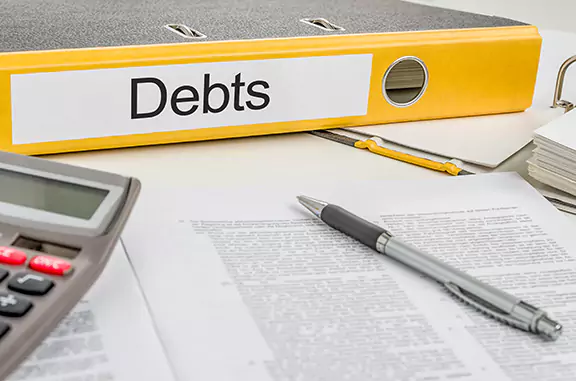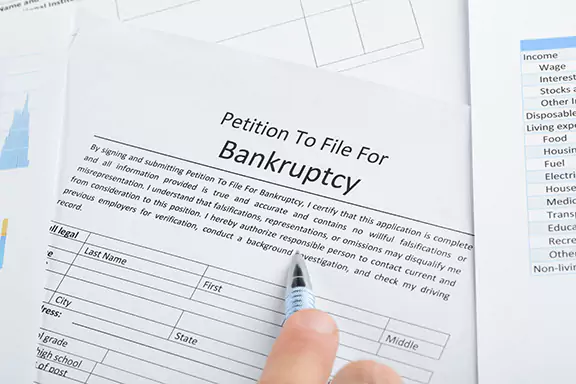Filing for bankruptcy can be a daunting decision, especially when dealing with overwhelming credit card debt. Many people face high credit card balances and find it difficult to keep up with payments. If you’re struggling with your credit card payments and debt and wondering if bankruptcy is an option, you’re not alone. Understanding the process and its implications can help you make an informed decision.
In this blog, we answer the question whether you can file for bankruptcy to eliminate credit card debt, explain what happens if you do file, a bankruptcy case and discuss alternatives that might be worth considering. By the end, you’ll have a clearer picture of your options and the steps you can take to regain control of your financial situation.
Can You File Bankruptcy for Credit Card Debts?
Yes, you can file bankruptcy for credit card debt.
Credit card debt is considered unsecured debt, meaning it’s not backed by collateral like a house or car. Both Chapter 7 and Chapter 13 bankruptcy can help you manage or eliminate this type of debt.
There are two types of bankruptcy filings.
Chapter 7 Bankruptcy
Eligibility: To qualify for Chapter 7, you must pass a means test, which compares your income to the median income in your state. If your income is below the median, you’re likely eligible.
Process: When you file for Chapter 7, you must provide detailed documentation of your assets, income, and debts. A bankruptcy trustee is appointed to review your case and arrange a meeting with your creditors.
Outcome: If approved, most or all of your credit card debt can be discharged, meaning it is eliminated. Chapter 7 typically resolves within six months and stays on your credit report for ten years.
Chapter 13 Bankruptcy
Eligibility: Chapter 13 is available to those with a steady income who can propose a repayment plan. There are limits on the amount of both unsecured debts and secured debt you can have.
Process: You submit a repayment plan to the your bankruptcy attorney or trustee, outlining how you will repay your debts over three to five years. Priority is given to secured and priority debts, with credit card debt often receiving lower priority.
Outcome: If you successfully complete your repayment plan, remaining credit card debt may be discharged. Chapter 13 stays on your credit report for seven years.
What Happens to Your Credit when Filing Bankruptcy for Credit Card Debt?
Filing for bankruptcy can have significant consequences on your credit score and financial life.
Chapter 7 bankruptcy can negatively impact your credit for ten years, while Chapter 13 bankruptcy filing affects your credit for seven years. However, it also offers a fresh start by eliminating unmanageable debt. It’s essential to weigh these factors carefully before deciding to file for bankruptcy.

Alternatives to Bankruptcy for Credit Card Debt
Before deciding to file for bankruptcy, it’s important to explore other options that might help you manage your credit card debt. Here are some alternatives to consider:
Debt Management Plans
How It Works: A debt management plan (DMP) is set up through a nonprofit credit counseling agency. The agency will negotiate with your creditors to lower interest rates and create a manageable repayment plan.
Benefits: You make a single monthly payment to the agency, which then distributes the funds to your creditors. This can simplify your payments and potentially reduce the total amount of interest you pay over time.
Debt Consolidation Loans
How It Works: A debt consolidation loan combines multiple debts into one loan with a single monthly payment, often at a lower interest rate.
Benefits: This can make it easier to manage your debt and may lower your monthly payments. However, it’s important to have good credit to qualify for a low-interest consolidation loan.
Debt Settlement
How It Works: Debt settlement involves negotiating with creditors to settle your debt for less than what you owe. This usually requires a lump sum payment.
Benefits: It can significantly reduce your total debt, but it may negatively impact your credit score and stay on your credit report for seven years.
Balance Transfer Credit Cards
How It Works: Transfer high-interest credit card debt to a new credit card with a 0% introductory APR for a set period.
Benefits: This can help you pay down the principal faster without accruing additional interest, but be sure to pay off the balance before the introductory period ends to avoid high interest rates.
Find Help from a Reputable Credit Counseling Agency
When considering a debt management plan, counseling or bankruptcy first consult with a nonprofit credit counseling agency with a good reputation. You can check their rating with the Better Business Bureau and read reviews from other clients. Be cautious of any credit counselor agency that charges high fees or makes unrealistic promises.
FREE Help from the Financial Counseling Association of America (FCAA)
EASY Wireless readers can access free credit counseling assessments with the nonprofit group, Financial Counseling Association of America (FCAA), an industry leading nonprofit group dedicated to helping consumers reduce debt and achieve financial stability.
Looking to Reduce Your Debt?
EASY Wireless has partnered with the Financial Counseling Association of America (FCAA) a non-profit organization to help you reduce your debt and take help you take back control of your finances.
If you want to learn more then check out the link below.
Get Help Reducing Your Debt
- FREE Consultation
- No Sign Up Fee
- No Obligation
FREE Cell Phone and Data Service with EASY Wireless
Reducing your expenses and keeping track of your financial status is crucial when managing credit card debt, and one effective way to do this is through the federal Lifeline program.
When you qualify for the Lifeline program through EASY Wireless, you’ll receive FREE Cell Phone Service with Talk Text and Data!
By cutting your monthly cell phone bill you can put more money toward paying down your credit card debt.
Click to see if you’re eligible for FREE Cell Phone Service from EASY Wireless.
File bankruptcy for Unsecured Debts as a Last Resort
Exploring all your options before deciding to file for bankruptcy is crucial. While bankruptcy can provide a fresh start, it also comes with long-term consequences. Consider alternatives like debt management plans, consolidation loans, debt settlement, and balance transfer credit cards.
Additionally, reducing expenses through programs like the Lifeline program can help you manage your debt more effectively. By carefully weighing your options and seeking professional advice, you can make the best decision for your financial future.


